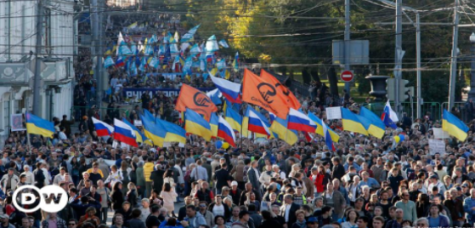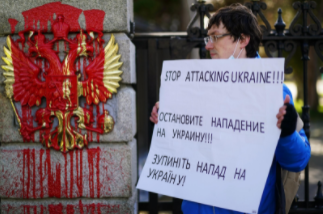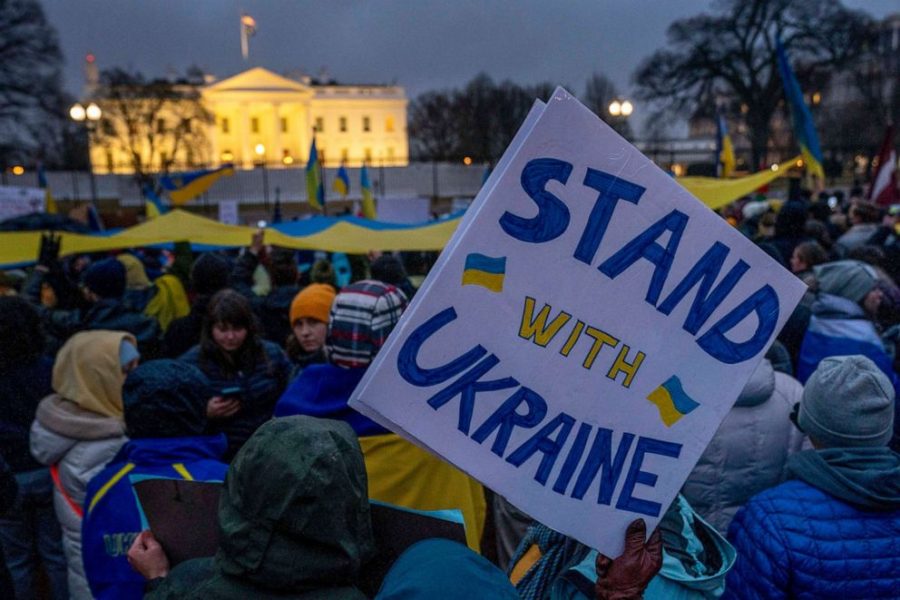Russia Represses the People, Criminalizes News, and Putin Threatens the World
March 24, 2022
As the war on Ukraine took off, citizens of Russia surprised the entire world. The streets of Moscow and Saint Petersburg began to see anti-war protesters daily. Despite the limited global information that made it onto Russian news, the Russian people spoke, and today they continue to speak out against their government.
Since the first week of the war, hundreds of anti-war protestors have been detained. According to OVD-Info, an independent human rights media project, around 13,000 protestors have been arrested for participating in rallies geared towards ending the war on Ukraine. Those detained report cuts, bruises, and electric burns from the police. Civilians arrested are also being abused when taken in for questioning. Marina Morozova’s story came out on an independent media outlet, Novaya Gazette, where she managed to sneak an audio recording into the police station. In the interrogation room, three police officers were questioning Morozova. One man threatened to shoot her, smash her with a chair, sexually assault her, and he then preceded to punch Morozova in the head.

Under article twenty-one of the Russian Constitution, the text states, “No one shall be subject to torture, violence or other severe or humiliating treatment or punishment.” Morozova’s story violates every aspect of protecting a citizen against the use of cruel and unusual punishment, especially out of the courtroom. Yet the Constitution also states under article 81 that “One and the same person may not be elected President of the Russian Federation for more than two terms running,” and by Vladimir Putin’s next presidential election he would have served two four-year terms and two six-year terms – – while remaining President until 2036. In reality, the Russian Constitution means nothing, and the people are protected under no law.
The corruptness extends from the interrogation room and spreads into the courtroom. Lawyers reported being denied access to their clients and those convicted were denied lawyer representation at court hearings.
Below is a list of violations of Human Rights and Liberties by the Russian law force and most importantly by the Russian government:
- Violation of freedom of expression and opinion
- Inhumane and degrading treatment/punishment
- Violation of freedom of protest
- Violation of the right to an attorney
- Death in custody
- Violation of children’s rights
- Violence and discrimination against ethnic minorities
- Killing journalists (Freedom of Press)
***The information above is based on the Russian Constitution, the European Convention on Human Rights (ECHR), the International Covenant on Civil and Political Rights (ICCPR), and the United Nations Against Torture and Other Cruel, Inhumane, or Degrading Treatment or Punishment.
On March 4th, Russia enacted two laws that criminalize independent war reporting and anti-war protests. Those found guilty would face penalties of up to 15 years in prison.
The laws impose strict censorship that controls the way people express their opinion. Further limiting the spread of information. Since these two laws were put into action, the words “war” and “invasion” were banned from being used to describe Russia attacking Ukraine. The vocabulary being banned in a country enters a new age of censorship where George Orwell, author of 1984, would die from shock after hearing the accuracy of his predictions and present day.

When it comes to the internet, Putin has tightened laws and regulations that affect online content and the privacy that goes along with it. In 2019, the “sovereign law” required internet service providers to allow authorities access to block all content the government has banned. Further regulations required VPNs to block a list of websites put together by the government.
One of Russia’s goals, as of this moment, is to control the information that comes into Russia and leaves it. By enacting these two laws, the government has the opportunity to not only end protests against the war but to silence any opinion that would lead others to believe that they are not alone. Putin did not gain the national support he expected from the people so censorship is his only option. Russian journalists, activists, politicians, and regular citizens are all in grave danger of facing harsh punishment because of opinions concerning their country’s place in the world.



